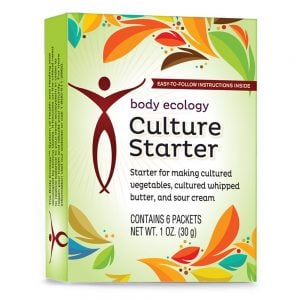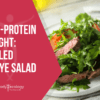The Truth About Fermented Foods and SIBO
During our recent Gut Summit, a member from the community sent us this question about fermented foods for SIBO:
“My understanding from Allison Siebecker’s work on SIBO is that fermented foods create more gas and bloating in the small intestine. Will you be covering this in the Summit?”
We were fortunate enough to have the chance to speak with Dr. Siebecker about fermented foods and small intestinal bacterial overgrowth.
You don’t have to cut fermented foods out of your diet completely to relieve painful signs of small intestinal bacterial overgrowth. When you heal the gut first, you can still enjoy cultured veggies made from the Veggie Culture Starter.
What Is SIBO?
Small intestinal bacterial overgrowth is exactly as it sounds: an overgrowth of bacteria living within the small intestine.
The problem is that the small intestine should be relatively free of bacteria. Its main role is to break down and absorb the nutrients in food. A healthy large intestine harbors many large communities of bacteria. But when these bacteria travel upward — into the small intestine — this is where problems begin.
According to Dr. Siebecker, food poisoning or the common stomach bug is the most common trigger of SIBO. Signs of infection include vomiting and diarrhea.
One key feature of SIBO is slow motility within the small intestine. Slow motility allows bacteria to set up communities and grow—resulting in gas and cramping intestinal pain.
Slow motility is linked to:
- Leaky gut
- Hypothyroidism
- Opioid drug use and prescription painkillers
- Stress, otherwise known as the fight-or-flight response
2 Life Hacks to Get Rid of SIBO
Dr. Siebecker explains this hard-to-treat overgrowth is usually the result of a missing ingredient.
In order to eliminate bacterial overgrowth in the small intestine, you need two things:
- A change in your diet.
- A prokinetic, a substance that stimulates movement within the small intestine.
Prokinetics encourage motility within the small intestine and keep it free of bacterial overgrowth. A prokinetic can be something as common as ginger root. Or, it can require a prescription, like low-dose erythromycin or low-dose Naltrexone.
But what about diet?
While treating this overgrowth, it is best to avoid foods that feed bacteria. This means sugars (like those listed in the FODMAP diet) and starchy, “high-residue” foods that are rich in fiber. While fiber and natural sugars act like a prebiotic, feeding good bacteria in the gut—in someone with SIBO, it can make the problem worse.
Fermented Foods for SIBO — With a Catch
The probiotics in fermented foods for SIBO can help recovery.
For example, researchers at Johns Hopkins University say that probiotics help the gut during the healing process by:
- Strengthening the gut barrier
- Controlling inflammation
- Decreasing pain (1)
In a recent paper, scientists underscored the value of probiotics, explaining that (in addition to the above) probiotic strains reduce the production of gas in the small intestine. (2)
Indeed, Dr. Siebecker endorses fermented foods. Fermented foods should be fully fermented, for at least 24 hours.
However, there are a very small number of people who do not respond well to D-lactate—an acid produced by some probiotic bacteria, including lactic acid bacteria like Lactobacillus acidophilus. These folks would do better with a probiotic that contains strains of Bifidobacteria.
Before you get rid of all probiotics and fermented foods that contain lactic acid bacteria, make sure you have changed your diet to one that is SIBO-friendly and that you’ve added in a prokinetic.
As Dr. Siebecker points out, there are so many benefits to fermented foods. Before you eliminate them, make sure you need to.
To hear my conversation with Dr. Siebecker and other thought-leaders in the field of gut health, head over to the Healthy Gut Summit and take a peek at what we’ve put together for you.
What To Remember Most About This Article:
Is it true that fermented foods for small intestinal bacterial overgrowth cause gas and bloating in the small intestine? Can this make things worse?
To answer this question, it helps to understand that your small intestine should be mostly free of bacteria. In your large intestine, you’ll find large communities of bacteria that can travel upward to the small intestine and cause problems. The most common trigger of SIBO may be food poisoning or a stomach bug.
Before you consider cutting fermented foods out of your diet, it’s important to focus on restoring gut health. Two simple changes can help to encourage motility in the small intestine and rid it of bacterial overgrowth.
Try these SIBO relief tips today:
- Change your diet. It’s critical to avoid foods that feed bacteria, like sugars and starchy, “high-residue” foods rich in fiber.
- Take a prokinetic. A natural prokinetic like ginger root can stimulate movement in the small intestine. Your doctor may also prescribe a prokinetic like low-dose erythromycin or low-dose Naltrexone to provide relief.
REFERENCES:
- Salem, A., & Ronald, B. C. (2014). Small Intestinal Bacterial Overgrowth (SIBO). J Gastroint Dig Syst, 4(225), 2.
- Miazga, A., Osiński, M., Cichy, W., & Żaba, R. (2014). Current views on the etiopathogenesis, clinical manifestation, diagnostics, treatment and correlation with other nosological entities of SIBO. Advances in Medical Sciences.









